ME Advocate Burnout. We Can’t Do This Alone
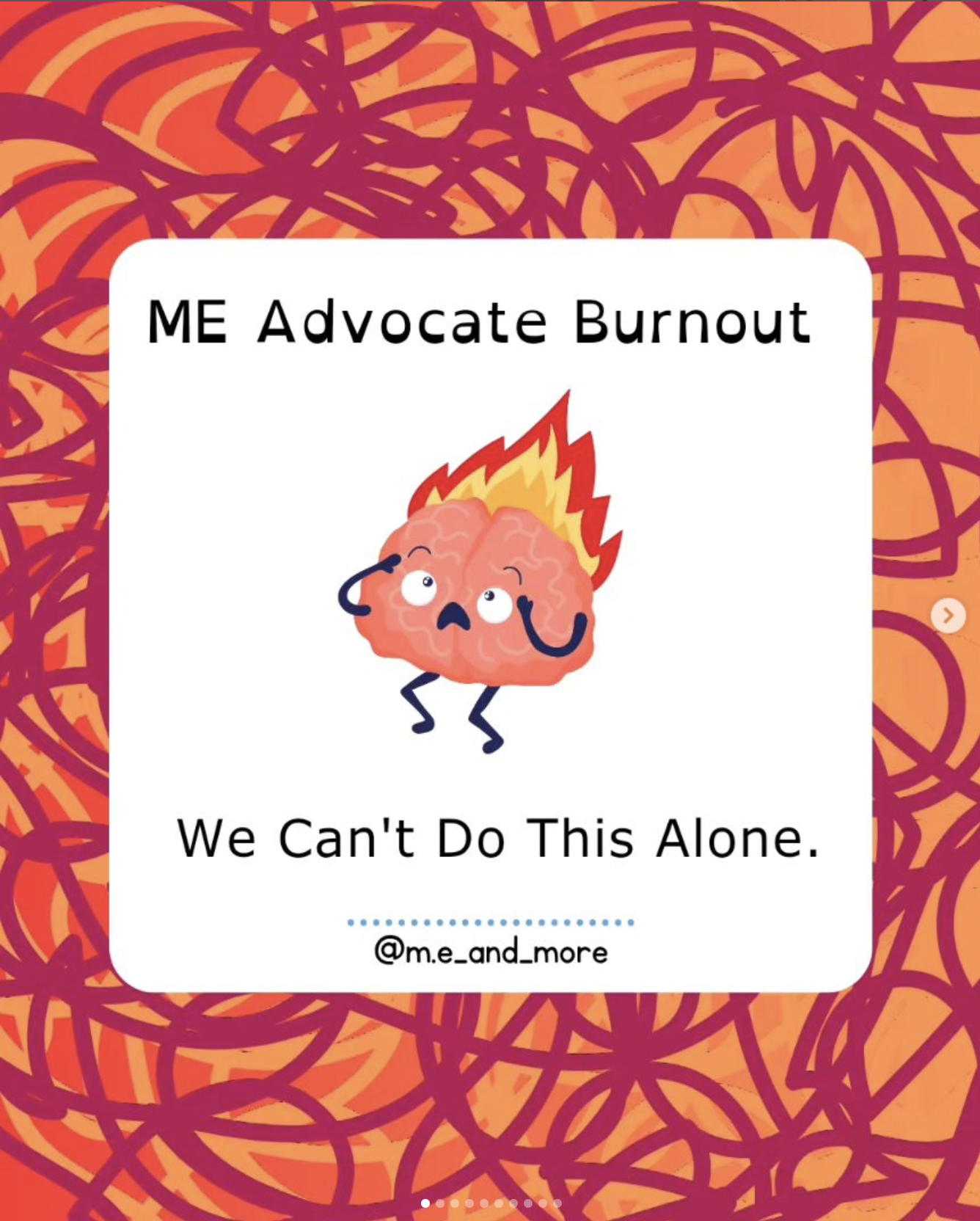
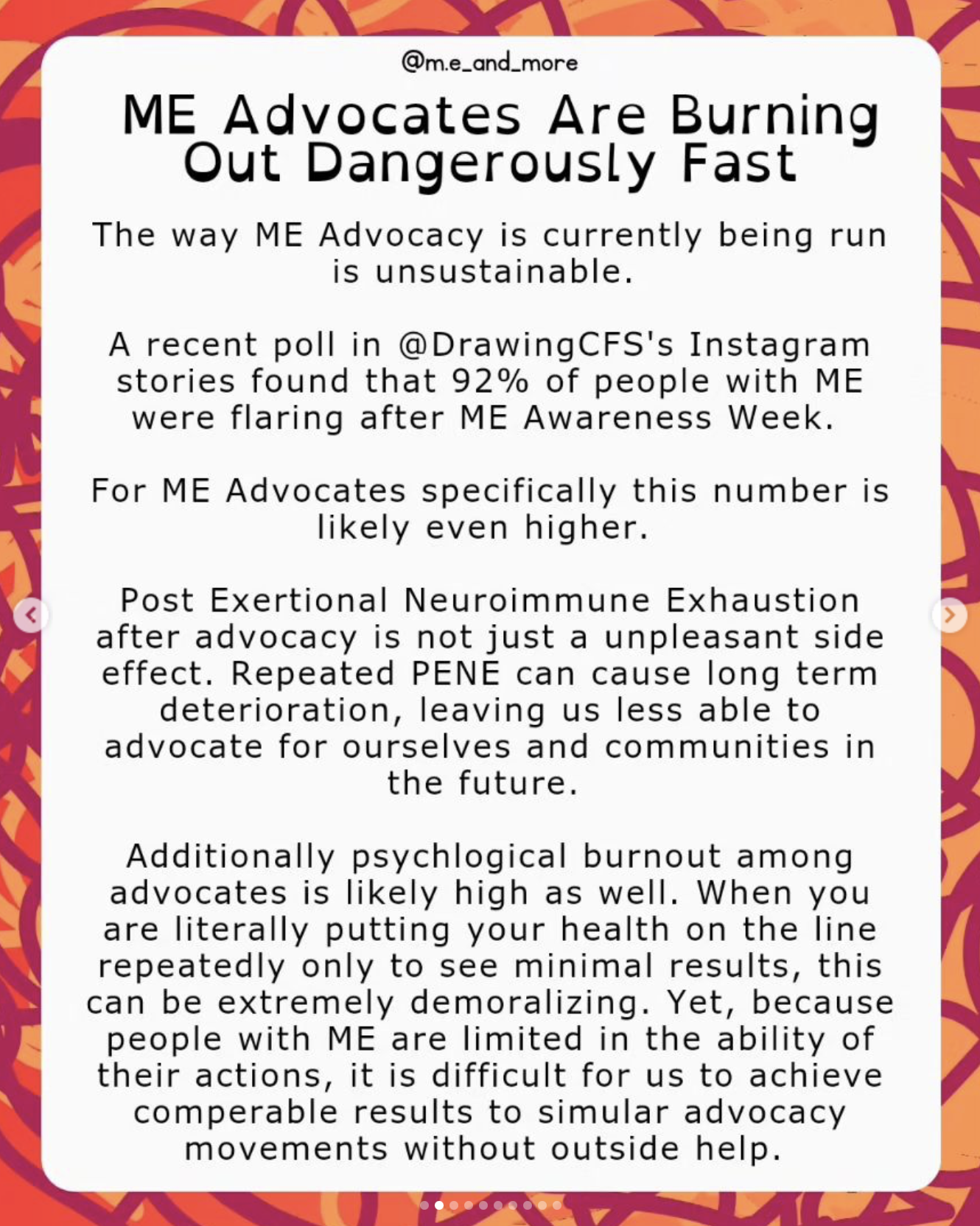
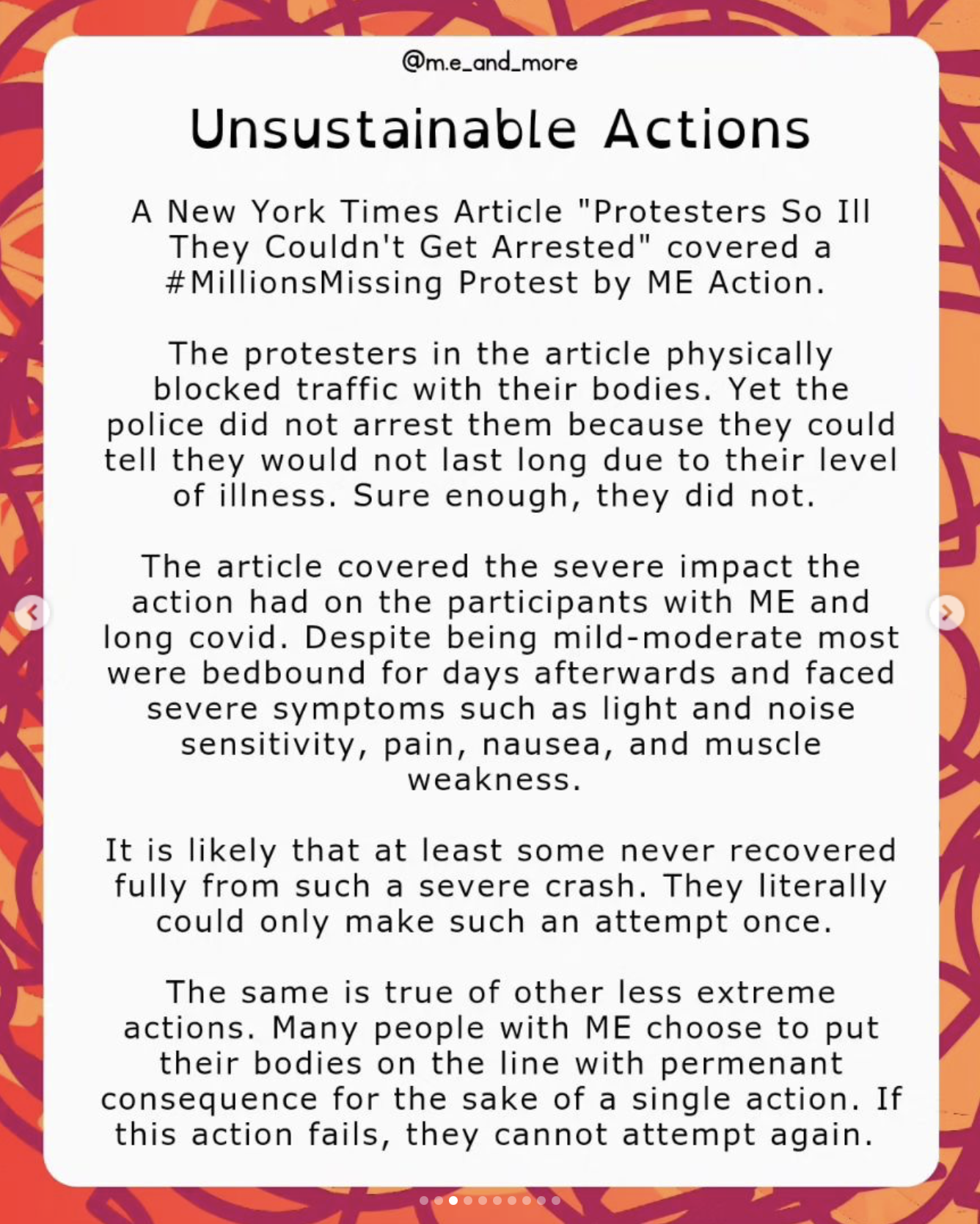
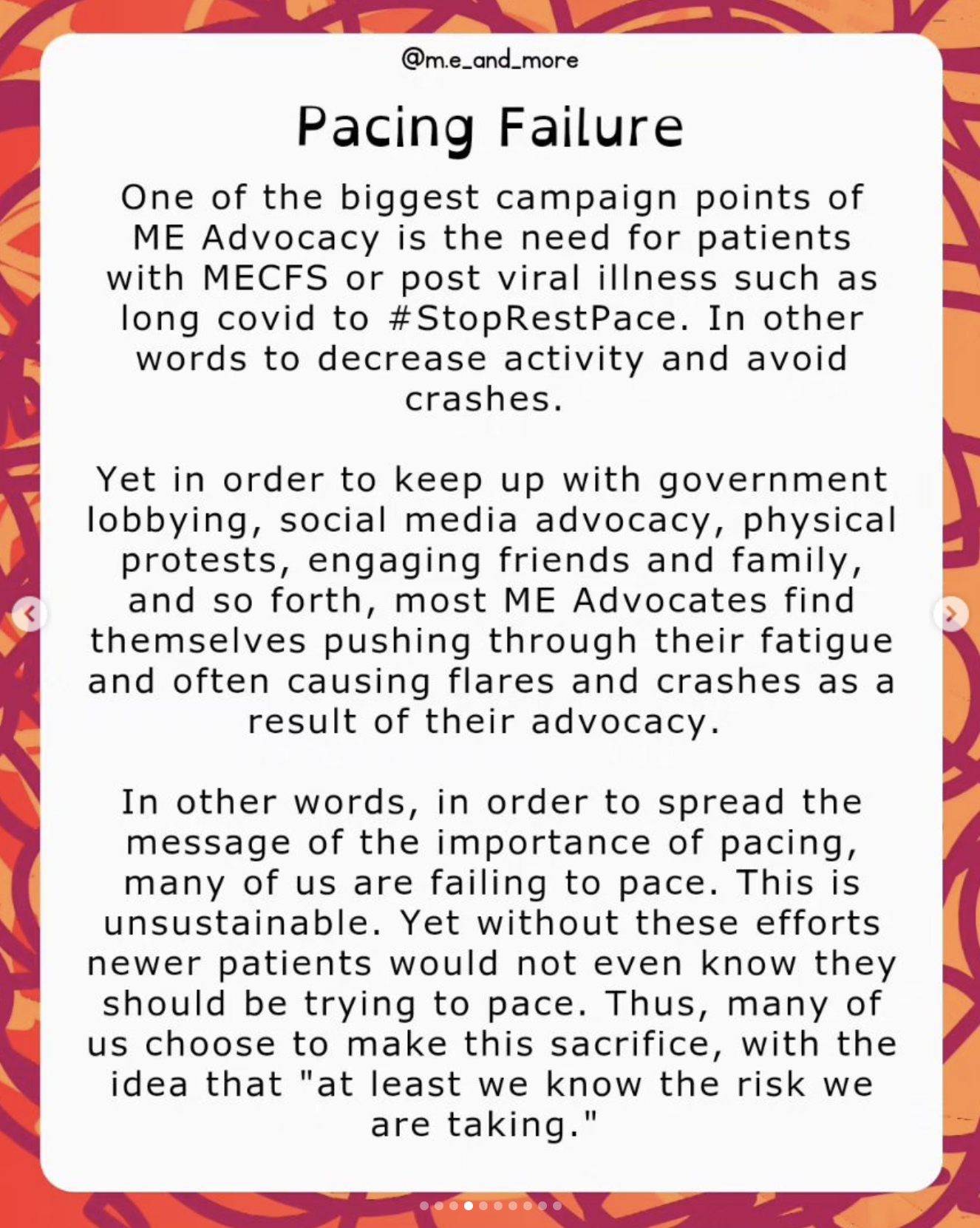
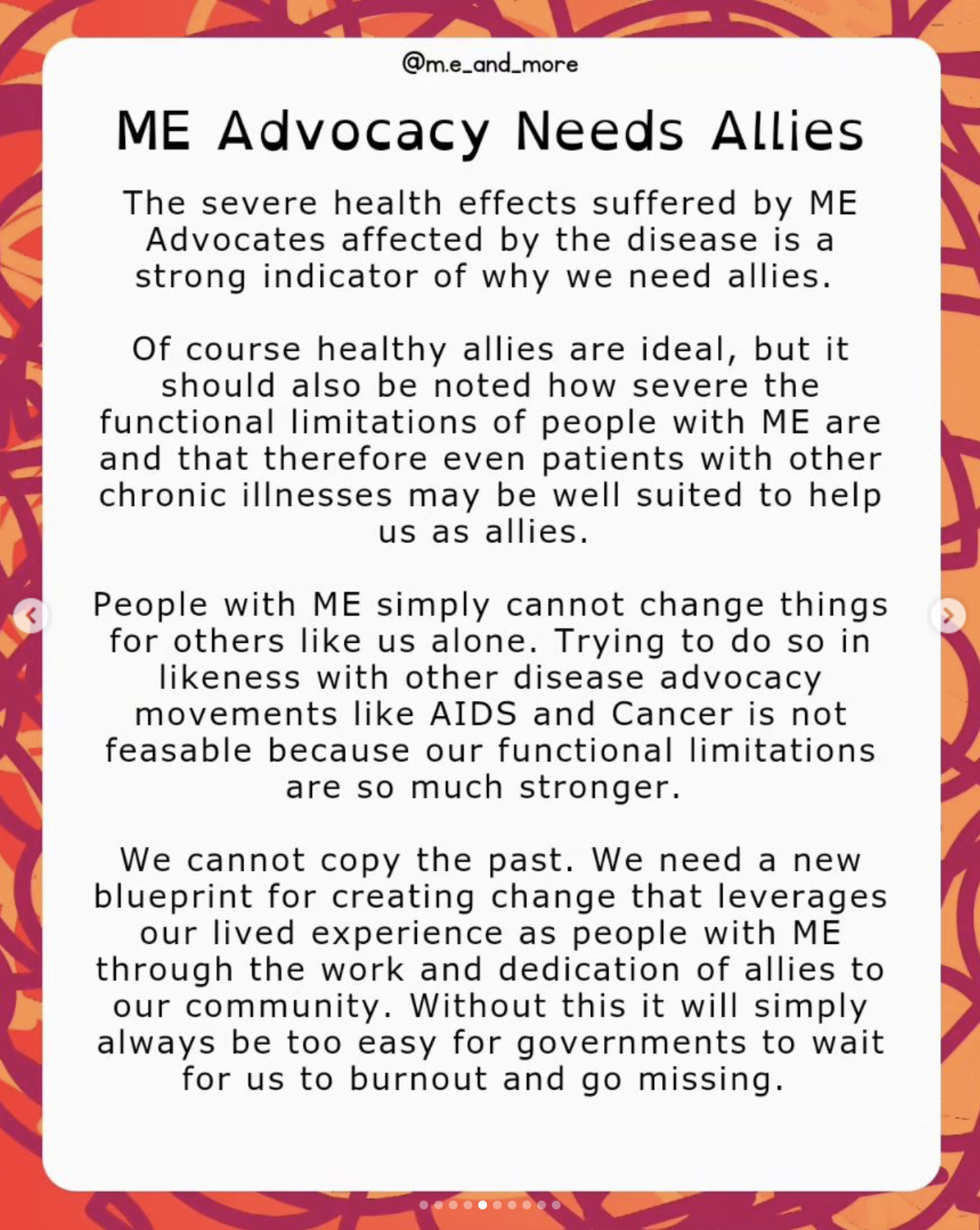
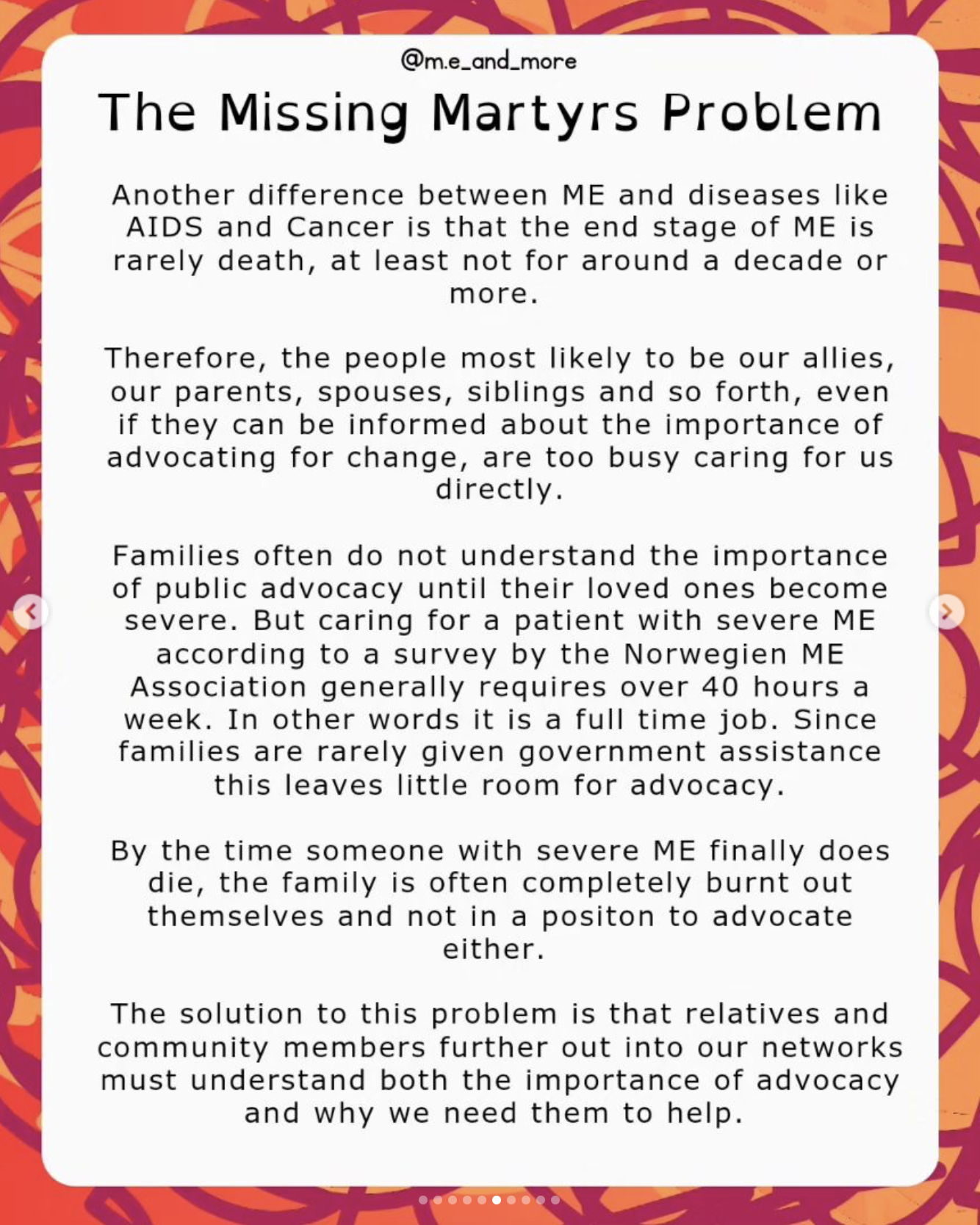
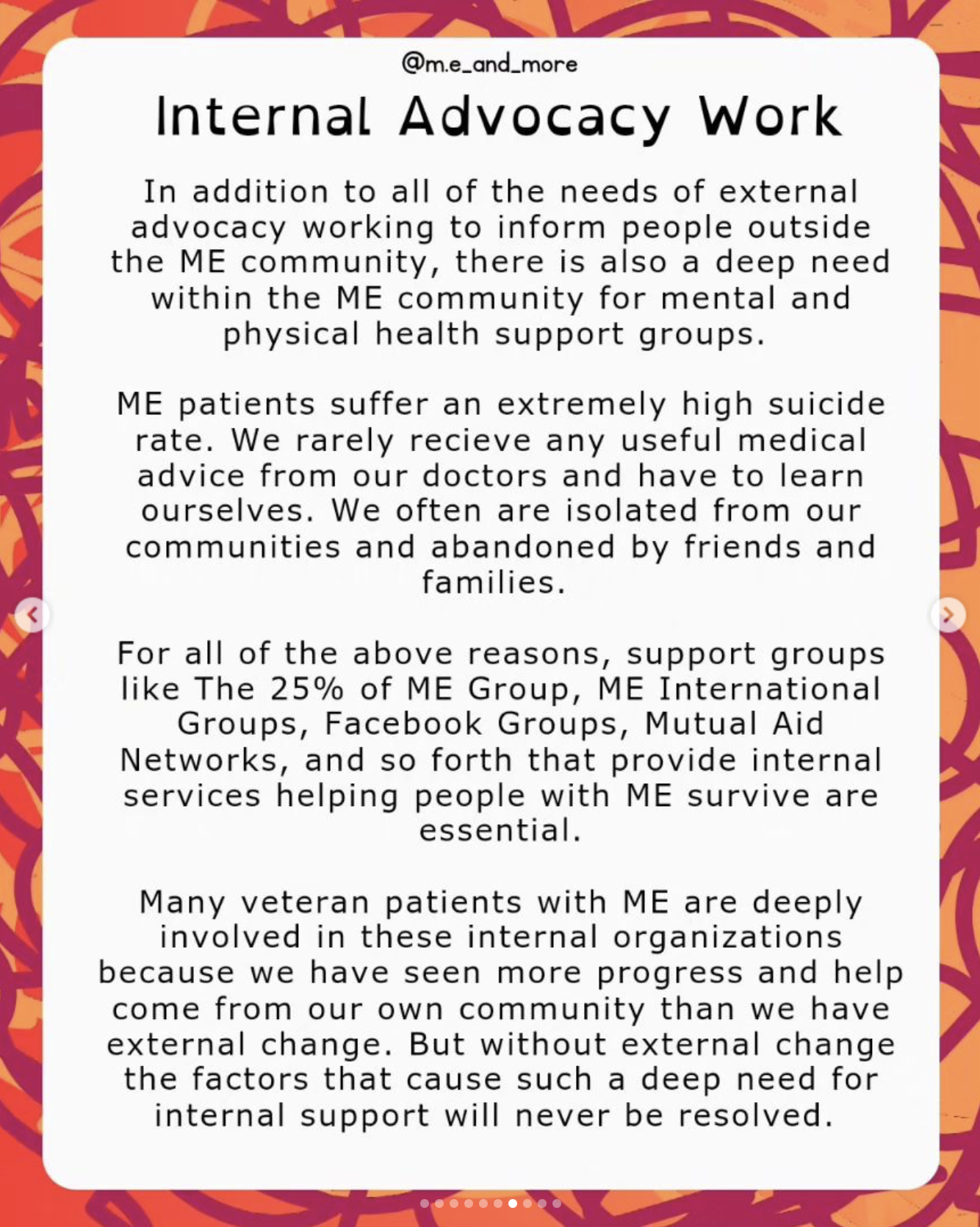
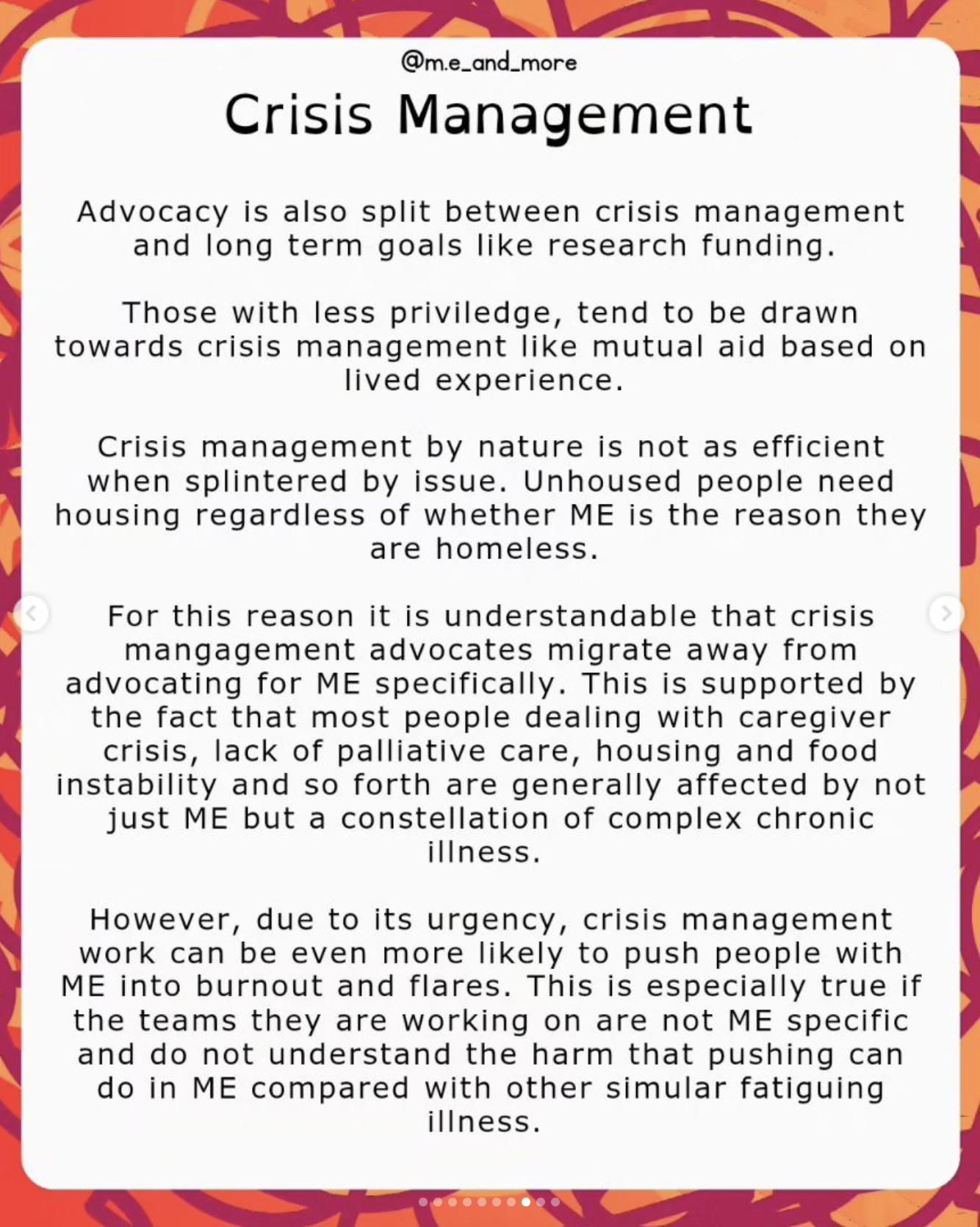
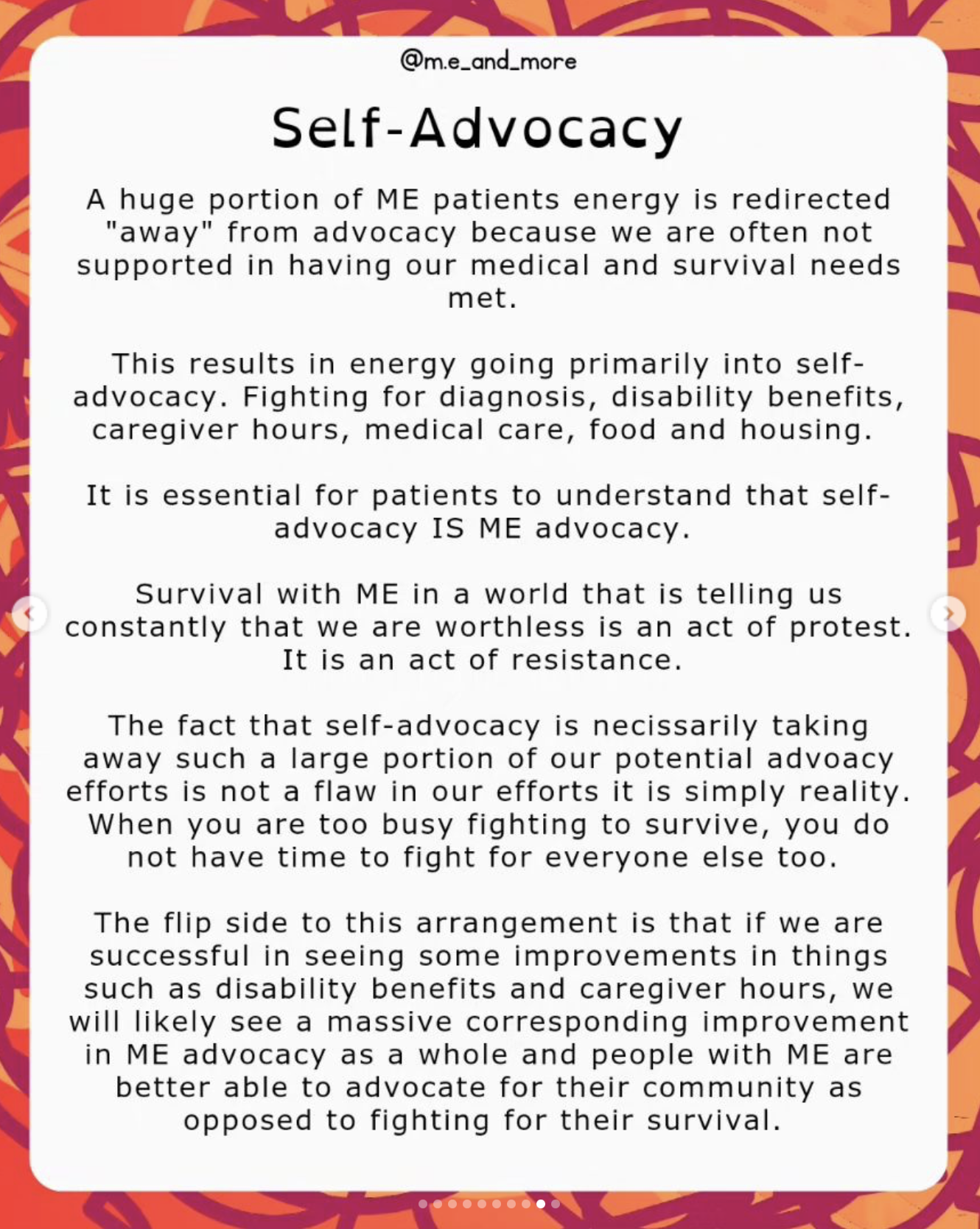
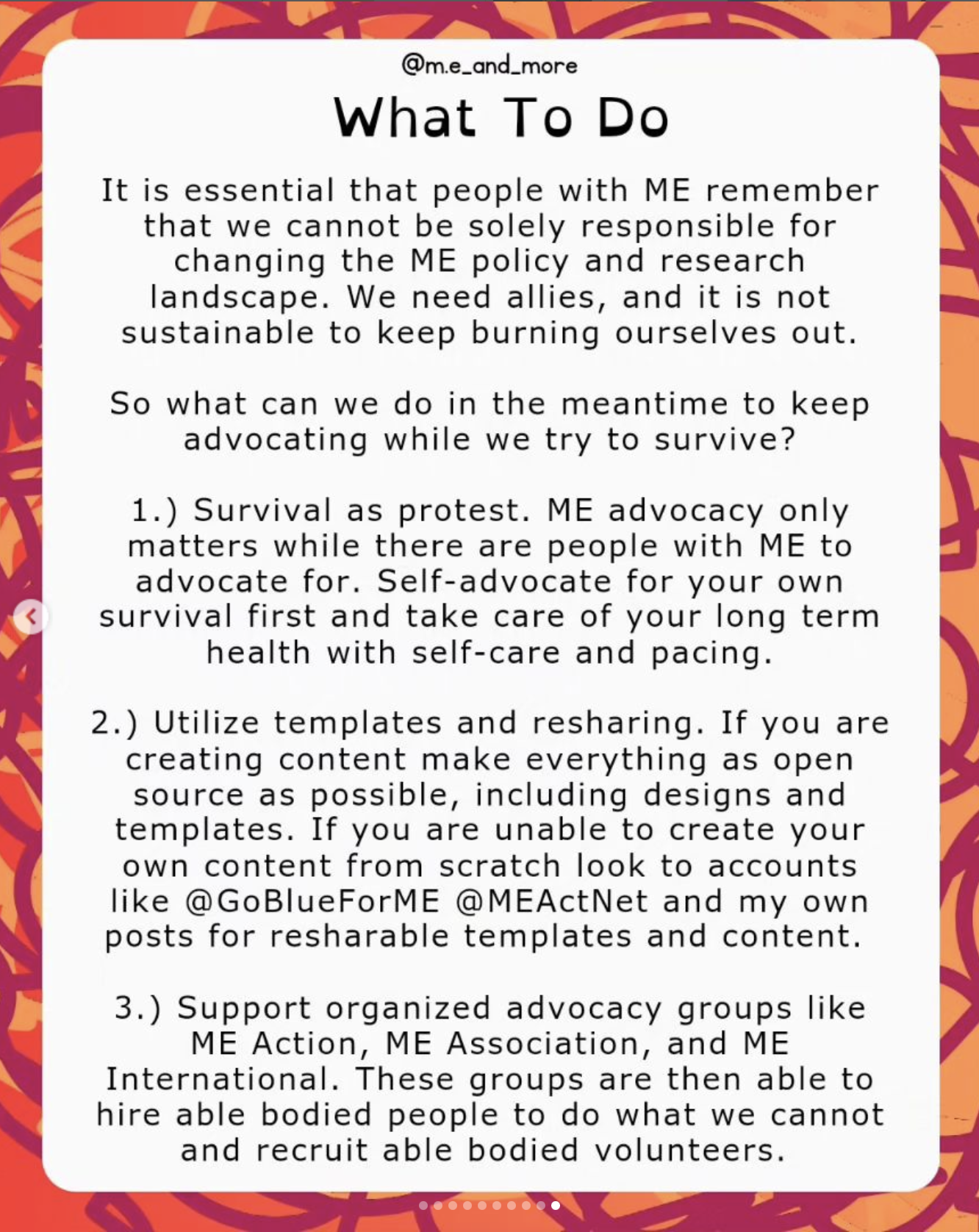
ME Advocates Are Burning Out Dangerously Fast
The way ME Advocacy is currently being run is unsustainable.
A recent poll in @DrawingCFS's Instagram stories found that 92% of people with ME were flaring after ME Awareness Week.
For ME Advocates specifically this number is likely even higher.
Post Exertional Neuroimmune Exhaustion after advocacy is not just a unpleasant side effect. Repeated PEE can cause long term deterioration, leaving us less able to advocate for ourselves and communities in the future.
Additionally psychlogical burnout among advocates is likely high as well. When you are literally putting your health on the line repeatedly only to see minimal results, this can be extremely demoralizing. Yet, because people with ME are limited in the ability of their actions, it is difficult for us to achieve comperable results to simular advocacy movements without outside help.
—-
Unsustainable Actions
A New York Times Article "Protesters So Ill They Couldn't Get Arrested" covered a #MillionsMissing Protest by ME Action.
The protesters in the article physically. blocked traffic with their bodies. Yet the police did not arrest them because they could tell they would not last long due to their level of illness. Sure enough, they did not.
The article covered the severe impact the action had on the participants with ME and long covid. Despite being mild-moderate most were bedbound for days afterwards and faced severe symptoms such as light and noise sensitivity, pain, nausea, and muscle weakness.
It is likely that at least some never recovered fully from such a severe crash. They literally could only make such an attempt once.
The same is true of other less extreme actions. Many people with ME choose to put their bodies on the line with permenant consequence for the sake of a single action. If this action fails, they cannot attempt again.
—-
Pacing Failure
One of the biggest campaign points of ME Advocacy is the need for patients with MECFS or post viral illness such as long covid to #StoRestPace. In other words to decrease activity and avoid crashes.
Yet in order to keep up with government lobbying, social media advocacy, physical protests, engaging friends and family, and so forth, most ME Advocates find themselves pushing through their fatigue and often causing flares and crashes as a result of their advocacy.
In other words, in order to spread the message of the importance of pacing, many of us are failing to pace. This is unsustainable. Yet without these efforts newer patients would not even know they should be trying to pace. Thus, many of us choose to make this sacrifice, with the idea that "at least we know the risk we are taking.
—-
ME Advocacy Needs Allies
The severe health effects suffered by ME Advocates affected by the disease is a strong indicator of why we need allies.
Of course healthy allies are ideal, but it should also be noted how severe the functional limitations of people with ME are and that therefore even patients with other chronic illnesses may be well suited to help us as allies.
People with ME simply cannot change things for others like us alone. Trying to do so in likeness with other disease advocacy movements like AIDS and Cancer is not feasable because our functional limitations are so much stronger.
We cannot copy the past. We need a new blueprint for creating change that leverages our lived experience as people with ME through the work and dedication of allies to our community. Without this it will simply always be too easy for governments to wait for us to burnout and go missing.
—-
The Missing Martyrs Problem
Another difference between ME and diseases like AIDS and Cancer is that the end stage of ME is rarely death, at least not for around a decade or
more.
Therefore, the people most likely to be our allies, our parents, spouses, siblings and so forth, even if they can be informed about the importance of advocating for change, , are too busy caring for us directly.
Families often do not understand the importance of public advocacy until their loved ones become severe. But caring for a patient with severe ME according to a survey by the Norwegien ME Association generally requires over 40 hours a week. In other words it is a full time job. Since families are rarely given government assistance this leaves little room for advocacy.
By the time someone with severe ME finally does die, the family is often completely burnt out themselves and not in a positon to advocate either.
The solution to this problem is that relatives and community members further out into our networks must understand both the importance of advocacy and why we need them to help.
—-
Internal Advocacy Work
In addition to all of the needs of external advocacy working to inform people outside the ME community, there is also a deep need within the ME community for mental and physical health support groups.
ME patients suffer an extremely high suicide rate. We rarely recieve any useful medical advice from our doctors and have to learn ourselves. We often are isolated from our communities and abandoned by friends and families.
For all of the above reasons, support groups like The 25% of ME Group, ME International Groups, Facebook Groups, Mutual Aid Networks, and so forth that provide internal services helping people with ME survive are essential.
Many veteran patients with ME are deeply involved in these internal organizations because we have seen more progress and help come from our own community than we have external change. But without external change the factors that cause such a deep need for internal support will never be resolved.
—-
Crisis Management
Advocacy is also split between crisis management and long term goals like research funding.
Those with less privilege, tend to be drawn towards crisis management like mutual aid based on lived experience.
Crisis management by nature is not as efficient when splintered by issue. Unhoused people need housing regardless of whether ME is the reason they are homeless.
For this reason it is understandable that crisis mangagement advocates migrate away from advocating for ME specifically. This is supported by the fact that most people dealing with caregiver crisis, lack of palliative care, housing and food instability and so forth are generally affected by not just ME but a constellation of complex chronic illness.
However, due to its urgency, crisis management work can be even more likely to push people with ME into burnout and flares. This is especially true if the teams they are working on are not ME specific and do not understand the harm that pushing can do in ME compared with other simular fatiguing illness.
—-
Self-Advocacy
A huge portion of ME patients energy is redirected "away" from advocacy because we are often not supported in having our medical and survival needs met.
This results in energy going primarily into self-advocacy. Fighting for diagnosis, disability benefits, caregiver hours, medical care, food and housing.
It is essential for patients to understand that self-advocacy IS ME advocacy.
Survival with ME in a world that is telling us constantly that we are worthless is an act of protest.
It is an act of resistance.
The fact that self-advocacy is necissarily taking away such a large portion of our potential advoacy efforts is not a flaw in our efforts it is simply reality.
When you are too busy fighting to survive, you do not have time to fight for everyone else too.
The flip side to this arrangement is that if we are successful in seeing some improvements in things such as disability benefits and caregiver hours, we will likely see a massive corresponding improvement in ME advocacy as a whole and people with ME are better able to advocate for their community as opposed to fighting for their survival.
—-
What To Do
It is essential that people with ME remember that we cannot be solely responsible for changing the ME policy and research landscape. We need allies, and it is not sustainable to keep burning ourselves out.
So what can we do in the meantime to keep advocating while we try to survive?
1.) Survival as protest. ME advocacy only matters while there are people with ME to advocate for. Self-advocate for your own survival first and take care of your long term health with self-care and pacing.
2.) Utilize templates and resharing. If you are creating content make everything as open source as possible, including designs and templates. If you are unable to create your own content from scratch look to accounts like @GoBlueForME @MEActNet and my own posts for resharable templates and content.
3.) Support organized advocacy groups like ME Action, ME Association, and ME International. These groups are then able to hire able bodied people to do what we cannot and recruit able bodied volunteers.
—-
As ME Awareness Month comes to a close many of us are feeling burntout, are experiencing #PostExertionalMalaise PEM / PENE and are crashing and flaring.
⠀
If this is you, you are not alone, it is not your fault, and you should not be responsible for so much.
⠀
The burden of ME Awareness and education about the debilitating illness MyalgicEncephalomyelitis CANNOT fall only on pwME.
⠀
People with MECFS get worse when we overexert. We have extremely limited functional capacity. We are not equipped to pursue the level of advocacy necessary to change our communities situation.
⠀
This is simply the reality of our lives. We must not place unrealistic expectations on ourselves. If we continue to run our movement on burnout and unsustainable actions, we will simply end up with a whole lot more severe ME.
⠀
The long Covid movement is new. It brings momentum and drive. But we have to be strategic in how we create change. Learn from organizations like @MEActNet who have been doing this longer. Learn that we cannot follow the blueprint of illnesses like AIDS and cancer because we are fundamentally different in how we are affected.
⠀
You are not single handedly responsible for the fate of the ME Community. Simply surviving this illness is an act of protest and resistance. For many it is the greatest act of protest they are capable of.
⠀
The paradox of ME is that people do not understand its severity because we are invisble. Yet we are invisible because of how severe the illness is.
⠀
This sucks. But we can't change this underlying reality. We have to get creative and find ways to resist that are within our capabilites. We have to build solidarity with others who have more functional capacity than we do.
⠀
People with fibromyalgia MCAS MCS POTS Lyme Disease and all complex ChronicIllness should care about ME/ CFS and we should care about them.
⠀
Progress in disability Benefits caregiver Support palliative Care community Building and mutual Aid these things benefit everyone, but they are necessary precursors to a world where ME advocacy is sustainable.
⠀
In the meantime, we must have self-compassion. We can't do this alone and shouldn't have to.